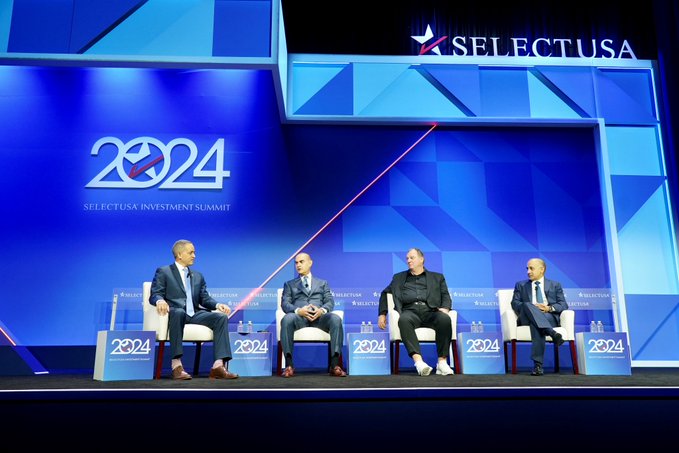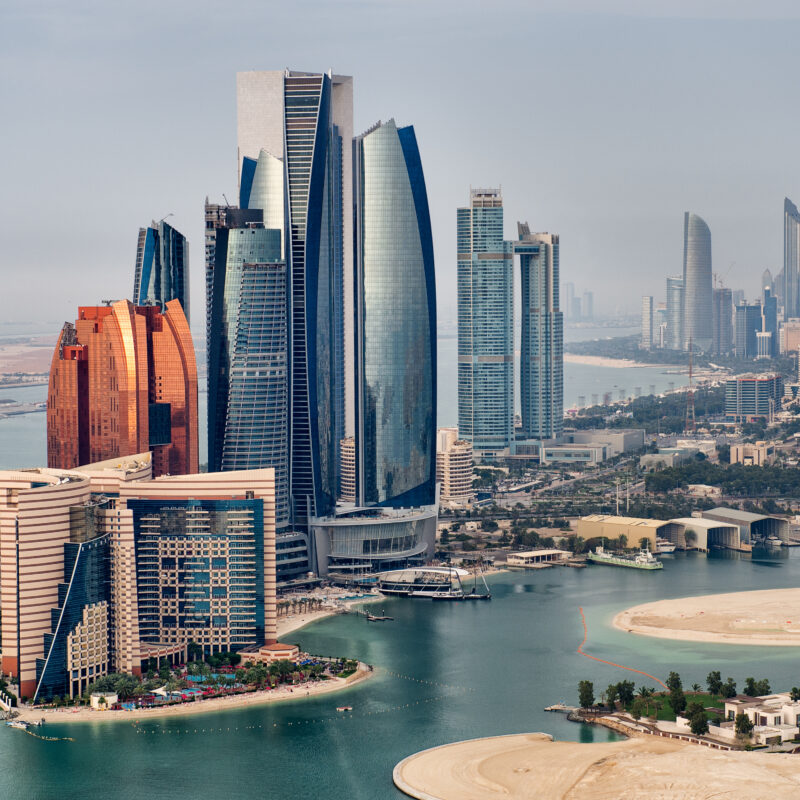The Weekly Circuit
👋 Good Monday afternoon in the Middle East!
The holy month of Ramadan begins this week with businesses and government offices across the MENA region shifting to shorter work hours to accommodate the daily Muslim fast. Ramadan is expected to start on Wednesday night, but the timing will not be confirmed until religious authorities make a formal declaration based on lunar observation.
The UAE issued guidelines for federal government offices, setting the workday during Ramadan from 9 a.m. to 2:30 p.m. on Monday through Thursday and 9 a.m. to noon on Fridays. Private businesses generally follow a similar schedule, but are being encouraged to offer flexible work hours during the month and allow employees to work from home. In Saudi Arabia, which follows a Sunday-to-Thursday workweek, the government set office hours from 10 a.m. to 3 p.m.
Outside MENA, the normal grind of work continues and the conference circuit pushes on. In London this week, the annual Mind the Tech gathering of Israel-connected companies and investors opens today, sponsored by Bank Leumi and the Calcalist newspaper. Among the participants will be senior executives from Nvidia, Warner Bros. Discovery, Lego, Tesco and the Bill and Melinda Gates Foundation. The conference will also feature appearances by Alex Brazier, managing director of the BlackRock Investment Institute; Julia Hoggett, CEO of the London Stock Exchange; and Jerusalem Mayor Moshe Lion.
Welcome to The Weekly Circuit, where we cover the Middle East through a business and cultural lens. Read on for the stories, deals and players at the top of the news. Please send comments and story tips to [email protected].
Spread the word! Invite your friends to sign up.👇
KINGDOM’S VENTURES
Bahrain’s Al Waha backs MENA startups from behind the scenes
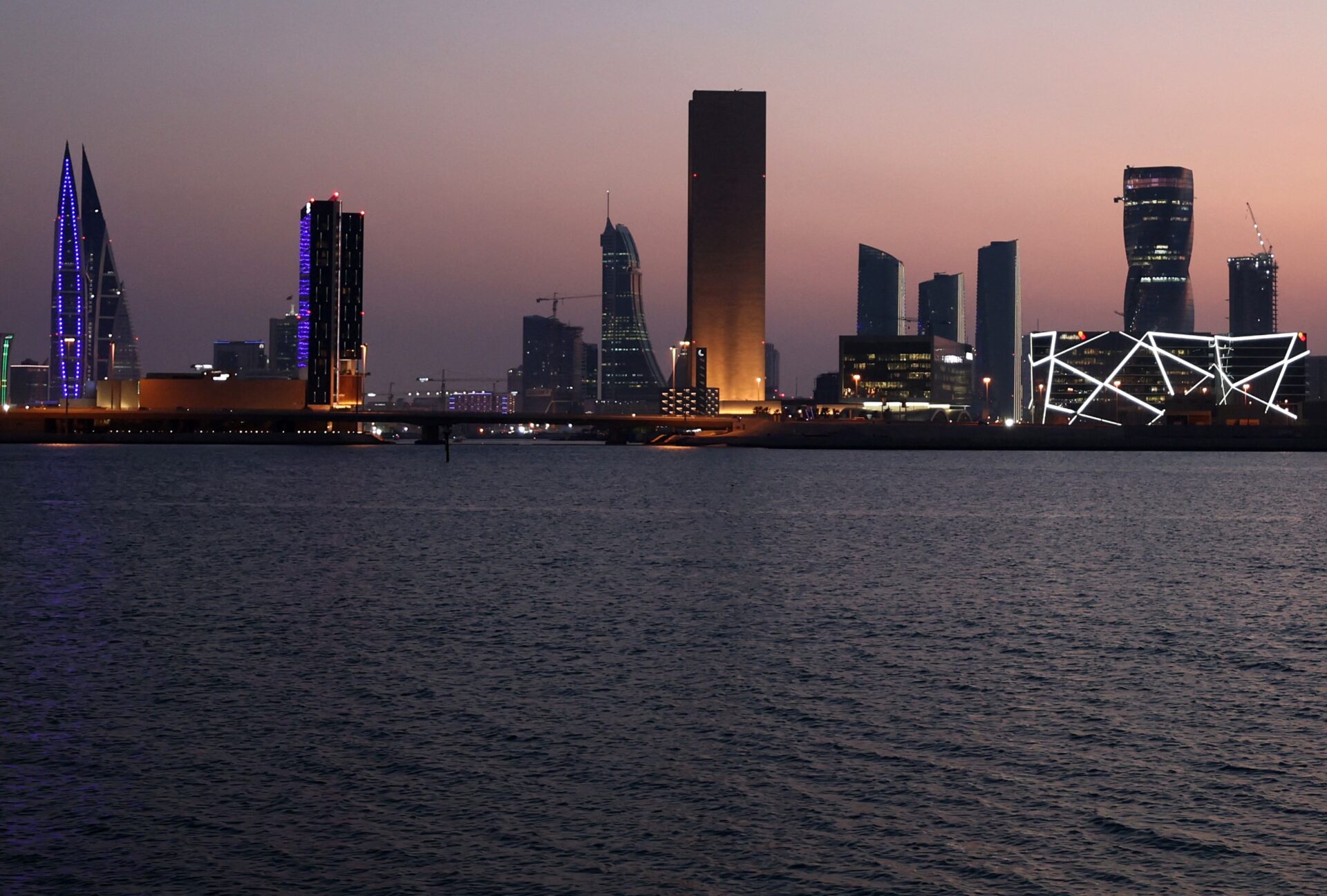
In the heyday of Bitcoin, the four co-founders of the Rain cryptocurrency exchange s aw a tantalizing opportunity when the Central Bank of Bahrain issued regulations allowing certain digital assets to be used for payments and handled by commercial banks. The move in 2019 toward normalizing crypto trading under a regulatory framework established the small island kingdom as an influential player in the notoriously unregulated industry and generated the interest of venture capital firms from the Gulf to Silicon Valley. Among the early funders of Rain was Bahrain’s Al Waha Fund of Funds, lending credibility when Kleiner Perkins, Paradigm and other top venture firms later decided to invest their own money, The Circuit’s Jonathan Ferziger reports from the Gulf state’s capital city of Manama.
Sovereign-backed fund: In fact, the money from Al Waha was dispensed through a variety of Gulf venture capital firms such as Middle East Venture Partners, VentureSouq and 500 Startups, which helped Rain establish itself as a regional leader among cryptocurrency exchanges. Little public note was made that the money originated in Al Waha, an arm of the Bahraini government that is backed by the small island kingdom’s $15.4 billion sovereign wealth fund, Mumtalakat. Al Waha, which has $100 million under management, prefers to stay behind the scenes, its director and fund manager, Areije Al Shakar, told The Circuit. Similarly, Al Waha provided funding for Calo, which analyzes a user’s nutritional needs and delivers meals custom-cooked according to the data, through 500 Startups.
Twisted drill bit: “There’s a huge opportunity that we’ve seen, and I think our success has shown that as a fund of funds, we’ve been able to back a number of Bahrain-based founders and their companies that springboard out of here and then work across the entire Gulf [region],” Al Shakar said in an interview on the sidelines of last week’s Connect2Innovate conference in the capital city of Manama. The event, organized by the Bahraini Ministry of Industry and Commerce and Israel’s Start-up Nation Central, brought together some 500 participants from the two countries, according to the organizers. The conference took place at Bahrain’s 46-story Wyndham Grand hotel, which looks like a twisted drill bit piercing the skyline. In the hotel’s top-floor ballroom, the conference got underway with Bahrainis in native robes mingling with jacketed but tieless Israelis over glasses of juice – the Wyndham doesn’t serve alcohol – and spinach pastry hor d’oeuvres.
Hunting unicorns: During the interview, Al Shakar said that because of Bahrain’s small size, it takes operating and raising funds across the six nations of the Gulf Cooperation Council and beyond for companies to reach a valuation of $1 billion. That’s the marker that separates the most attractive companies, which are adoringly referred to in the VC industry as “unicorns,” from smaller, struggling startups. “What we’ve seen is that unicorn status really comes because you’re able to expand across the GCC,” said Al Shakar, a 42-year-old career banker who previously worked for BNP Paribas, Lehman Brothers and Citibank. She earned degrees in finance from the John Molson School of Business in Montreal and in public policy and management from the School of Oriental and African Studies at the University of London.
Israel investments: Among other Mideast-focused funds in which Al Waha invests are BECO Capital, Shorooq Partners and BY Venture Partners. Since the Abraham Accords normalized ties between Bahrain and Israel in 2020, Al Waha has also invested in LionBird, a firm with offices in Israel and the U.S. that focuses on digital health startups. “There’s a lot of knowledge transfer that happens,” Al Shakar said. “Whether it’s fintech, whether it’s healthcare technology, there’s a lot for us to learn from the Israeli ecosystem.”
Click here to read the full story:
GLOBAL COUNSEL
Greenberg Traurig expands legal business across Middle East
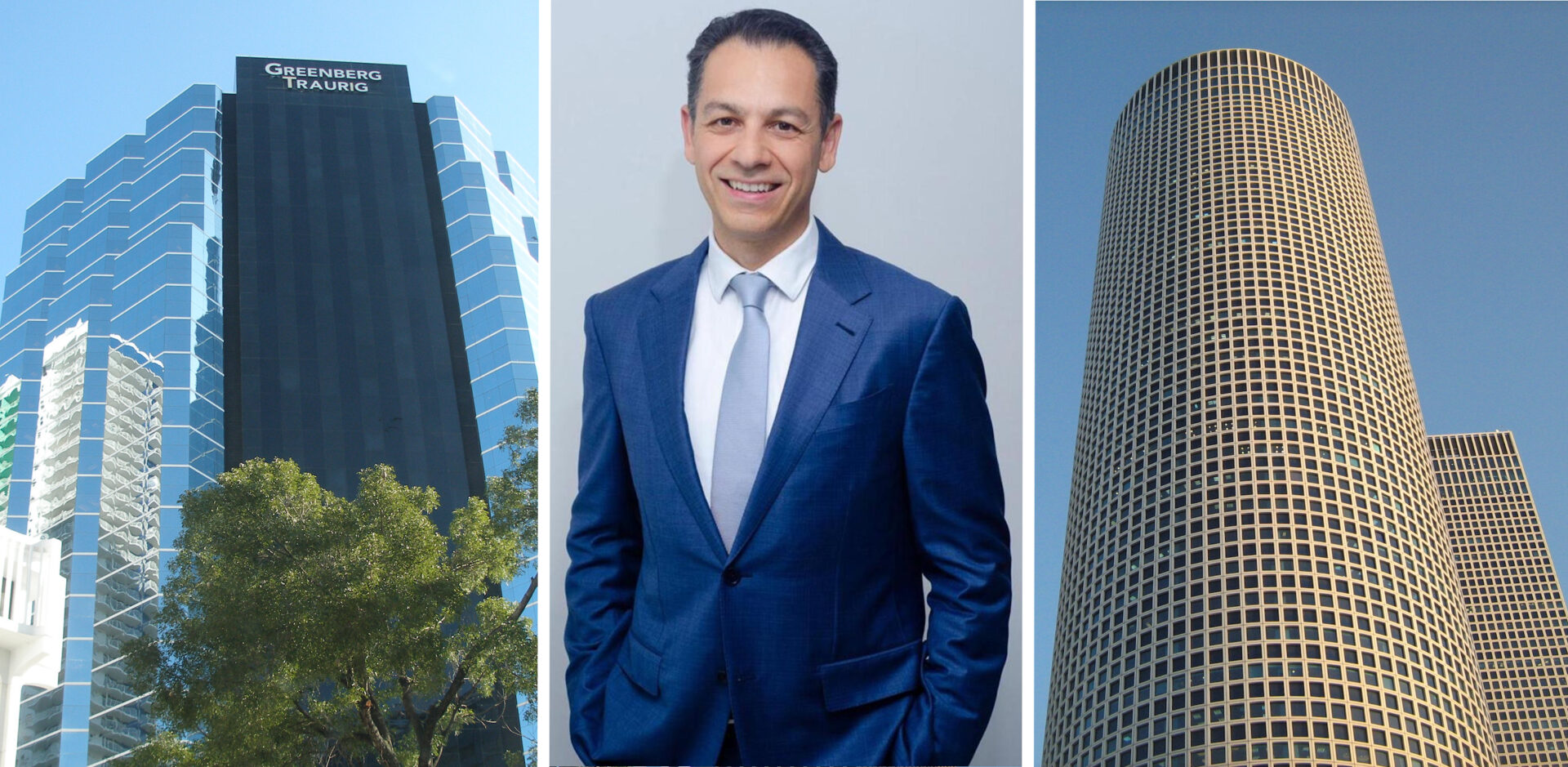
Greenberg Traurig’s Joey Shabot, managing shareholder for Israel branch; Towers in Miami and Tel Aviv housing Greenberg Traurig offices
Greenberg Traurig, a top-tier U.S. law firm that expanded into Saudi Arabia last week, is counseling clients in Israel to position themselves through the current business lull for whenever the technology market rebounds, Shoshanna Solomon reports for The Circuit. As the Tel Aviv branch sees more mergers and acquisitions in the meantime, its top manager, Joey Shabot, said now is the time for startups to make the complex legal preparations for carrying out a successful initial public offering once conditions improve. “It doesn’t happen overnight,” Shabot told The Circuit in an interview at his 30th-floor office in Tel Aviv’s Azrieli Center. “To get ready to become an IPO company, it takes like a year and a half.”
Riyadh office: Eleven years after he helped open Greenberg Traurig’s Israel office, the first foreign law firm to set up shop in the country, Shabot, the managing shareholder, leads a team of 19 attorneys billing clients for services in fields ranging from banking and labor law to data privacy and cybersecurity. The firm, which employs 2,650 lawyers worldwide, posted its ninth consecutive year of growth, generating nearly $2.2 billion in 2022 revenue. Founded 56 years ago in Miami, Greenberg Traurig broadened its Middle East footprint through a formal affiliation announced on March 14 with the Riyadh-based Khalid Al-Thebity Law Firm. At the same time Greenberg Traurig is applying to operate as a joint venture with Al-Thebity under new rules that allow international firms to offer advising services as long as their Saudi partners hold at least 25% of the partnership. The Saudi firm specializes in project finance, infrastructure and privatization deals. It was previously affiliated with Cleveland-based Squire Patton Boggs.
Investor interest: In Israel, Shabot said foreign investors are still keen on investing in Israeli startups even as a global slowdown and high interest rates are roiling global economies and a proposed judicial overhaul is raising questions about the country’s political direction and financial stability. “International investors are no less interested today than they were a year ago or two years ago in making acquisitions or investments in Israel,” Shabot said. “What I can tell you is in terms of the effect [of the judicial reform debate] on our business, we haven’t seen it,” he said. Leading economists, jurists and tech leaders have criticized the changes in the court system proposed by Prime Minister Benjamin Netanyahu’s governing coalition. The legislation has sparked widespread protests. .
International practice: GT’s entry into Israel coincided with the evolution of the nation’s tech industry, which saw entrepreneurs holding onto their companies for longer, and building them into larger, sometimes billion-dollar entities, as opposed to selling them off quickly to the highest bidder, as was customary in earlier days. This transition has enabled international law firms and accountants to offer growing companies a network of services for their global business strategies, helping them to set up foreign subsidiaries, hire and fire workers abroad, hold IPOs and implement M&A deals worldwide and comply with international markets, Shabot said. “The presence of such international law firms is important… as it offers a gateway for Israeli businesses and entrepreneurs seeking legal counsel worldwide,” Niron Hashai, dean of the Arison School of Business at Reichman University in Herzliya, Israel, told The Circuit.
Click here to read the full story:
INVESTMENT IMPACT
N7 spotlights projects that could provide resources for Middle East
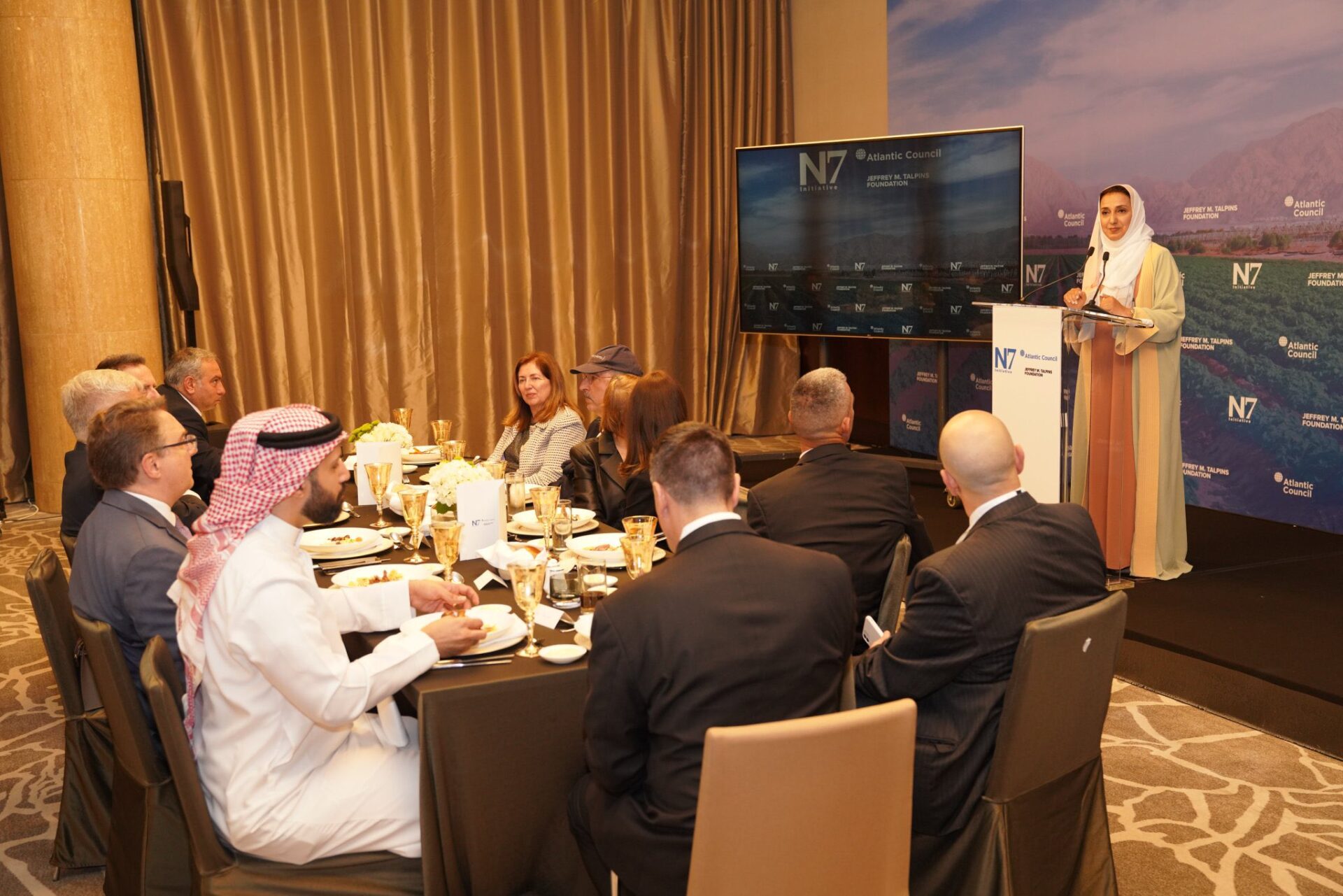
What can the Abraham Accords countries learn from an impact investor who is focused on electrifying sub-Saharan Africa? Angela Homsi said she found herself answering that question from a number of people she met at last week’s N7 Conference on Agriculture, Water and Food Security in Abu Dhabi, United Arab Emirates, Robert Lakin reports for The Circuit. Beirut-born Homsi co-founded the renewable energy company Ignite Power as a vehicle for supplying remote villages across the world’s least-connected continent with the tools and infrastructure they need to prosper in the modern world. Teaming up over the past seven years with organizations such as the World Bank, UK Aid Direct, Power Africa and Bloomberg New Energy Finance, Homsi has focused on bringing electricity, fresh water and internet access to some of the poorest countries on earth.
Global problems: Homsi’s company, which has its main offices in the United Arab Emirates and Israel, was one of the Middle Eastern businesses featured at last week’s N7 Conference, a project of the Atlantic Council and Jeffrey M. Talpins Foundation aimed at showing tangible benefits from the normalization of ties between Israel and its Arab neighbors. “I grew up in these places,” Homsi told The Circuit. “From the start of my career, I’ve wanted to find solutions that would help with the situation in our region.” The one-time Goldman Sachs trader was born to Jewish and Christian parents in the midst of the long-running Lebanese civil war. “Our relationship together is not about a few more billions of dollars of bilateral trade, it’s about what our partnership could mean for us in unlocking massive problems that are really global problems,” she said in a Zoom interview from Abu Dhabi.
Regional lessons: Ignite’s successes with solar power projects in Rwanda and Mozambique offered lessons in developing processes and smart operations that Homsi hopes can be applied in tandem with the N7 Initiative, which is focused less on senior government officials and more on experts and program-level executives. “When the water scientists, the ag-tech entrepreneurs and the climate experts pool their knowledge and resources, they can apply solutions to the issues that present challenges, but also opportunities that are common to all the countries of the Middle East and North Africa region,” said the N7’s initiative director, Daniel Shapiro, who was U.S. ambassador to Israel during the Obama administration, from 2011 to 2017. The N7 Initiative is working to expand normalization between Israel and Arab and Muslim countries. In October 2021, it convened the first-ever gathering of ministers and other senior officials from Israel, Morocco, Egypt, Jordan, Sudan, Bahrain and the UAE. This time four other nations participated that do not have ties with Israel, but preferred not to be identified.
Tony Blair: The conference brought together more than 100 politicians, academics and NGO executives in what organizers of the N7 Initiative hoped would be a successful follow-up from January’s Negev Forum working group meetings and the N7’s December conference on education and coexistence. The three-day program featured opening keynote remarks from Tzachi Hanegbi, Israel’s national security advisor, and Nawal Al-Hosany, the UAE’s permanent representative to the International Renewable Energy Agency. Hanegbi expressed Israeli Prime Minister Benjamin Netanyahu’s desire to expand the number of countries joining the Abraham Accords. Meanwhile, the second day’s lunch crowd heard via video link from former U.K. Prime Minister Tony Blair, who is now executive chairman of the eponymous London-based Institute for Global Change. Following Blair was U.S. Sen. Cory Booker (D-NJ), who is co-chair of the Abraham Accords Caucus. Booker was one of a handful of U.S. congressional leaders who had a virtual presence at the event.
Actual deliverables: “At a time when political dynamics are injecting a degree of instability into new regional relationships, participants from 11 different nations convened together to discuss tangible initiatives relating to water, food security and agriculture technologies,” Shalom Lipner, a Jerusalem-based, nonresident senior fellow with the Atlantic Council who worked on the conference in Abu Dhabi, told The Circuit. “Their enthusiasm to propose actual deliverables, real projects that aim to improve quality of life for all peoples of the region, was inspiring and holds the promise for a better future in a beleaguered part of the world.”
Click here to read the full story:
Circuit Chatter
Arabian Express: Saudi Arabia signed a preliminary agreement with Italy’s Arsenale Group to create a luxury passenger train running on a route across the kingdom.
Expat Layoffs: Kuwait plans to terminate about 1,815 expatriate teachers at the end of the academic year in an effort to increase job opportunities for native Kuwaitis.
Risk Factor: Mobileye Global listed in its 2022 annual report the battle over Israeli government efforts to overhaul the judiciary as one of the company’s risk factors.
Hovering Ambulance: Abu Dhabi’s Bayanat and Japan’s Aerwins Technologies unveiled a flying vehicle called the Xturismo Hoverbike that could be used to rescue people injured in remote terrain.
Next for SVB: Royal Group, controlled by UAE National Security Adviser Sheikh Tahnoon bin Zayed, may seek to buy defunct Silicon Valley Bank’s U.K. subsidiary.
Cut-Rate Kuwait: Kuwait’s Jazeera Airways is launching a low-cost airline in Saudi Arabia, which is planning to start a new second national airline called Riyadh Air.
Bot Wars: Abu Dhabi’s Technology Innovation Institute is working on an artificial intelligence platform to rival OpenAI, DeepMind and other language-driven applications.
Closing Circuit
Leveraged Buyout: Apollo Global Management will acquire chemical manufacturer Univar Solutions for $8.1 billion through a leveraged buyout financed in part by the Abu Dhabi Investment Authority.
Port Pact: Abu Dhabi’s AD Ports Group signed a 30-year agreement worth $200 million to develop and operate Egypt’s Safaga port on the Red Sea.
Getting Hotter: Ormat Technologies, an Israeli geothermal energy, is seeking to raise $300 million in an offering managed by Goldman Sachs.
IPO in Cairo: Egypt may add eight state-owned companies to the 32 in which it plans to sell shares in a wave of initial public offerings on the Cairo Stock Exchange.
A.I. Insurance: Israel’s Fairmatic, an A.I.-powered car insurance company, raised $46 million in a financing round led by Battery Ventures.
Lebanese Low: The sinking Lebanese pound reached a historic low, trading among dealers at 100,000 to the U.S. dollar, down from 60,000 in January. The official rate is 15,000 Lebanese pounds to the dollar.
Ticket to Ride: Israel’s Via transportation startup paid a reported $100 million to acquire Citymapper, a U.K.-based journey planning app.
Online Shades: The Abu Dhabi Investment Authority is investing $500 million in India’s Lenskart, an online eyewear retailer valued at $4.5 billion.
Cyber Deal: Minerva Labs, an Israeli cybersecurity company, is being acquired by Boston-based Rapid7 for $45 million.
On the Circuit
Michael Alan Ratney won Senate approval to become the U.S. ambassador to Saudi Arabia, nearly a year after his nomination by President Joe Biden.
Ibrahim Ajami, head of venture investments at Abu Dhabi’s Mubadala, said the $284 billion sovereign wealth fund aspires to be one of the world’s top three tech investors.
Ali Sherif al-Emadi, Qatar’s former finance minister, will face a criminal trial on charges that include bribery, abuse of power, and money laundering. He was arrested in 2021.
Israeli Finance Minister Bezalel Smotrich cut short his 10-day overseas trip after being confronted at every U.S. stop by protests to the government’s proposed judicial overhaul. He had planned to meet South American finance ministers in Panama and visit Paris.
Saudi Finance Minister Mohammed Al-Jadaan said his government will “quickly” consider investing in Iran following a Chinese-brokered plan to restore diplomatic ties.
Ahead on the Circuit
March 20-21, London: Mind the Tech 2023. Israeli tech, finance and innovation conference in U.K., sponsored by Bank Leumi and the Calcalist. Sanderson Hotel.
March 20-21, Dubai, UAE: World Blockchain Summit. Technology leaders, executives, investors meet to discuss latest trends in blockchain industry. Atlantis The Palm Dubai.
March 28-30, Ramat Gan, Israel: World Diamond Congress. Diamond dealers from across the globe meet in Israel for 40th international gathering. Israel Diamond Exchange.
April 21, Dubai, UAE: Global Business Summit 2023. Corporate heads, policy makers, thought leaders come together to discuss economic agendas. Floral Grand Hotel.
May 2-3, Tel Aviv, Israel: Agritech Israel. Introducing innovative farming technologies for growing food and meeting the challenges of climate change, water shortages and desertification. Expo TLV.
May 3, Tel Aviv, Israel: GoForIsrael Investment Conference. Connecting global investors and technology companies. Co-hosted by Cukierman & Co and Catalyst Investment. Tel Aviv Hilton.
May 11, Dubai, UAE: Annual Private Wealth Middle East Forum. Conference connecting family offices, high-net-worth wealth managers and investors. Shangri-La Hotel.
May 30, Airport City, Israel: Annual Economic Conference for Kibbutz Industry. Meeting for financial chiefs of Israeli kibbutz farms and companies. Avenue Conventions and Events Center.
Culture Circuit
Will Smith at the Camel Races: Banned from the Academy Awards after his famous slap of comedian Chris Rock at the Oscars ceremony a year ago, actor Will Smith went to Saudi Arabia last week to watch camel racing. The Hollywood star, who won the best actor prize last year for his role in “King Richard” attended the firstl AlUla Camel Cup on Friday, which distributed $21 million in prize money. Smith flew to the remote desert site in a private plane with Mohammed Al Turki, a Saudi film producer and chief executive of the Red Sea International Film Festival. Also seen with Smith was music producer Swizz Beatz, husband of singer Alicia Keys and the first American to own a camel racing team in Saudi Arabia. The team, named Saudi Bronx, placed fifth in the competition. Two Emirati brothers won $1.9 million each when their camels won the “Heil” and “Zmoul” races on the event’s final day.
Perez Wins Saudi Grand Prix: Sergio Perez cruised to victory in the Saudi Arabian Grand Prix on Sunday, following up after his Red Bull teammate and world champion Max Verstappen came in first place last week on the Formula One circuit in Bahrain. This time, Verstappen came second on the Jeddah Corniche track. Fernando Alonso, driving for Aston Martin, finished third.
Financing Film: Saudi Arabia has launched a $234 million financing program to promote moviemaking in the kingdom. The government’s Cultural Development Fund announced it will offer financial grants to both local and foreign firms with the goal of boosting local content.






